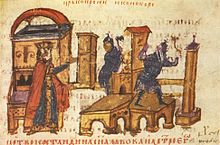Comparison Between the Treatment of Foreign Cultures Within the Byzantine and Islamic Empire
Eastern Europe was a very important place after the fall of the Roman Empire. The Byzantine Empire was all that remained slightly Roman, but the idea of the Roman Culture slowly fell away from them as Greek became the language of state officials and the Greek Cultures collided with the remnants of the Roman. Over time, the Byzantine Empire was considered completely Greek. However, to the south, the Islamic Empire finally united under one leader who was known as the Caliph. This empire wasn't Christian like the Byzantine Empire, they followed the teaching of Islam, as the empires were so close to each other, this created a strong conflict of religion. The Islamic people were very tolerant of other Religions, while the Byzantines wanted everybody in their empire to be Christian, evident when they exiled the Jews because of their defiance. To themselves, each different party thought that their way was right, but which was ideal for the people living under such a rule?
Byzantine Empire
The Byzantines were extremely strict on what they wanted their people to worship. For the largest amount of time, the Byzantines were Christians who still had loyalties to the Pope, back in Rome. In the Tenth Century, the Jewish people were exiled fro
m the entire empire, and had to fend for themselves. This was mostly because of the Arabic pressure in the east, but this does show what the Byzantines think of foreign religion or culture. The Byzantines also ordered the destruction of icons throughout the empire, icons of different religions and even Christianity. They felt the icon wrongly created a sense of hubris. The Byzantines wanted religious unification, which looked very good to the Pope, and other Christians in the west. Both of the different empires had steps and rules about how they would treat different religions or cultures, but which one would be the best for the people themselves?
 |
| Painting of the Iconoclasm |
Islamic Empire
 |
| Islamic Durham |
Outline
Byzantine Empire
1. Exiled different religious or cultural groups
2. Began the Iconoclasm, the removal of all religious icons from their culture
3. Constantly warred with the Muslims over religion
4. Not very tolerant of any non-Christian culture or religion
Islamic Empire
1. Began the Jizya Tax, taxing people in their realm who did not follow Islam
2. Taxed people evenly based on income and wealth
3. Refrained from taxing people incapable of maintaining a stable source of income, or the sick
4. Extremely tolerant of other religions or cultures
Similarities
1. Both religions did what was socially acceptable, to their own respective cultures
2. Both Empires try to promote their religion to others in the best of their ability
Sources
Primary Sources:
Islam: "Manas: History and Politics, Aurangzeb." Aurangzeb's Fatwa on Jizya. N.p., 17 July 2006. Web. 11 Dec. 2013. <http://www.sscnet.ucla.edu/southasia/History/Mughals/Aurnag_fatwa.html>.
Byzantine: "Byzantine and Islam Tension and Conflict." Ancient History: ABC- Clio. N.p., 24 Feb. 2005. Web. 11 Dec. 2013. <http://ancienthistory.abc-clio.com/Topics/Display/1185300?cid=41&terms=Islam>.
Secondary Sources:
Angelov, Dimiter (2007). Imperial Ideology and Political Thought in Byzantium (1204–1330). Cambridge, United Kingdom: Cambridge University Web
"The Islamic World, 600–1500 CE." ABC-Clio. N.p., 12 Mar. 2007. Web. 18 Dec. 2013. <http://ancienthistory.abcclio.com/Search/Display/588504?terms=Islamic Empire>.
No comments:
Post a Comment